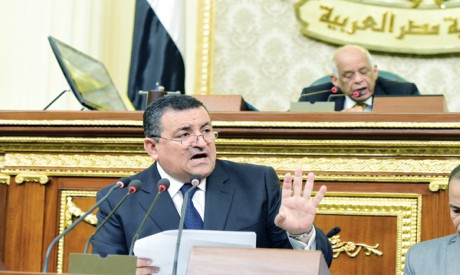
Osama Heikal, head of Egypt parliament’s Media, Culture and Antiquities Committee and a former minister of information
Osama Heikal, head of Egypt parliament’s Media, Culture and Antiquities Committee and a former minister of information, said in a recent interview he would support amending the constitution to extend the presidential term from four to six years.
Heikal, who is also head of Media Production City, told CBC Extra News Channel last week that he would like to see a number of articles in the constitution changed.
“A number of articles need to be reconsidered. But when I and others say this we are immediately accused of wanting only to revise the length of the presidential term,” said Heikal.
“The fact is the constitution has a lot of flawed articles, not just the one setting the length of the president’s time in office.”
According to Heikal, articles such as that stipulating the government spend at least 10 per cent of GDP on education, health and scientific research, are ill-conceived.
“Policies change and the government must be free to reduce spending on one sector in favour of another,” said Heikal.
Heikal said he has no objection to individuals holding the office of president for a maximum of two terms but wants to see the length of a term extended to six years.
“A four-year presidential term is all very well for a superpower like the US, but it is bad for a country like Egypt which lies in a very volatile region replete with terrorist threats and economic troubles,” said Heikal.
Egypt fell into a state of chaos in 2011, says Heikal, and the government was in disarray until 2014, the year when President Abdel-Fattah Al-Sisi was elected.
Yet the constitution, which was also compiled in 2014, ignored this history. “Instead of writing the constitution to reinforce stability, it was drafted with Article 140 on presidential terms which could cause instability in the future.”
Ashraf Rashad, head of the Future of Homeland Party, would also like to see the presidential term extended to six years.
Parliamentary Spokesperson Salah Hassaballah told reporters that “many MPs support the amendment of Article 140 and also the repeal of Article 103 which requires MPs to devote all their time to parliamentary work and prevents them from pursuing other activities.”
Salah Fawzi, a professor of constitutional law at Mansoura University and advisor to Parliamentary Speaker Ali Abdel-Aal, told reporters that no official requests had been submitted to amend the constitution.
“Those who support amending Article 140 believe that extending the presidential term will enhance economic and political stability and provide a better opportunity for the president to implement his development programme in a timely fashion,” said Fawzi.
Opposition leftist MPs oppose any changes to the constitution. They argue the real aim of any amendments is to strengthen the powers of President Al-Sisi and help him stay in office for as long as possible.
Other MPs agree with Margaret Azer, deputy head of the Human Rights Committee, who argues that amending any of the constitution’s articles is a sensitive issue and must be studied carefully.
MP Ismail Nasreddin, a supporter of longer presidential terms, says that although many MPs would back the move there is as yet no organised campaign among them to force the issue.
In an interview with CNBC in November 2017 President Al-Sisi said he is against any changes to the constitution.
“I am in favour of the two-term limit, with each term set at four years. Right now we have a functioning constitution and I am not for it being changed,” said Al-Sisi.
*A version of this article appears in print in the 16 August 2018 edition of Al-Ahram Weekly under the headline: Four years or six?
Short link: